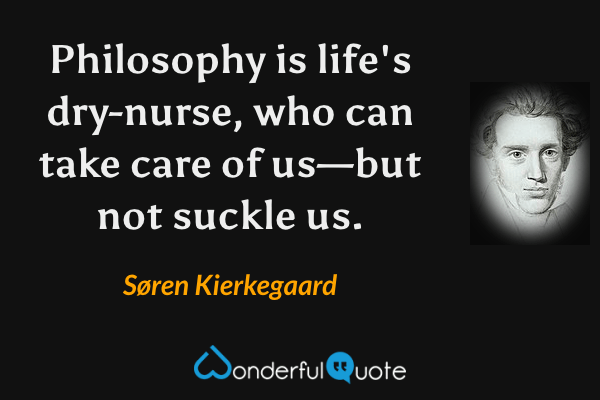Søren Kierkegaard Quotes
Most popular Søren Kierkegaard Quotes

Anxiety is the dizziness of freedom.

Above all, do not lose your desire to walk.

I know the truth only when it becomes life in me.

Perfect love means to love the one through whom one became unhappy.

Life can only be understood backwards; but it must be lived forwards.

Philosophy is life's dry-nurse, who can take care of us—but not suckle us.

It takes moral courage to grieve; it takes religious courage to be joyful.

The tyrant dies and his rule is over; the martyr dies and his rule begins.

Patience is necessary, and one cannot reap immediately where one has sown.

Most men pursue pleasure with such breathless haste that they hurry past it.

Christendom has done away with Christianity without being quite aware of it.

It requires moral courage to grieve; it requires religious courage to rejoice.

Most people pursue pleasure with such breathless haste that they hurry past it.

To dare is to lose your "foothold" for a moment. Not to dare is to lose yourself.

Just tell me how you judge your childhood and youth, and I will tell you who you are.

People demand freedom of speech to make up for the freedom of thought which they avoid.

This is the road we all must travel—over the Bridge of Sighs into the peace of eternity.

Above all, do not lose your desire to walk. I have walked myself into the best thoughts.

Spiritually, a man's thoughts must be the building in which he lives—otherwise it is wrong.

Truth is not introduced into the individual from without, but was within them all the time.

If I have ventured wrongly, very well, life then helps me with its penalty. But if I haven't ventured at all, who helps me then?

Pleasure disappoints, possibility never. And what wine is so sparkling, what so fragrant, what so intoxicating, as possibility!

From earliest childhood, an arrow of grief has been embedded in my heart. As long as it remains there, I am ironic—if it is drawn out, I will die.

Philosophy is perfectly right in saying that life must be understood backward. But then one forgets the other clause—that it must be lived forward.

During the first period of a man's life the greater danger is: not to take the risk. When once the risk has been really taken then the greatest danger is to risk too much.

If I were to wish for anything, I should not wish for wealth and power, but for the passionate sense of the potential, for the eye which, ever young and ardent, sees the possible.

Adversity draws men together and produces beauty and harmony in life's relationships, just as the cold of winter produces ice-flowers on the window-panes, which vanish with the warmth.

There are many people who reach their conclusions about life like schoolboys; they cheat their master by copying the answer out of a book without having worked out the sum for themselves.

One should not think slightly of the paradoxical; for the paradox is the source of the thinker's passion, and the thinker without a paradox is like a lover without feeling: a paltry mediocrity.

There are many people who arrive at answers in life just like schoolboys; they cheat their teacher by copying the answer out of the arithmetic book without having worked the problem out themselves.

The majority of people are subjective toward themselves and objective toward all others, terribly objective sometimes; but the real task is, in fact, to be objective toward oneself and subjective toward all others.

The greatest hazard of all, losing one's self, can occur very quietly in the world, as if it were nothing at all. No other loss can occur so quietly; any other loss—an arm, a leg, five dollars, a wife, etc.—is sure to be noticed.

Above all, do not lose your desire to walk: every day I walk myself into a state of well-being and walk away from every illness. I have walked myself into my best thoughts, and I know of no thought so burdensome that one cannot walk away from it.
Above all, do not lose your desire to walk: every day I walk myself into a state of well-being and walk away from every illness; I have walked myself into my best thoughts, and I know of no thought so burdensome that one cannot walk away from it.


